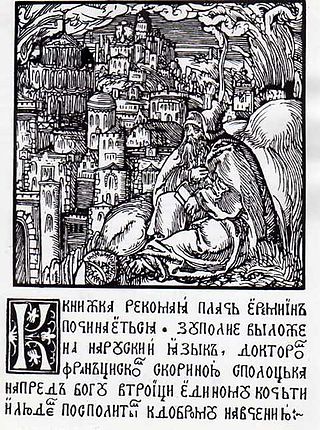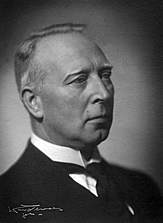Related Research Articles

The Book of Lamentations is a collection of poetic laments for the destruction of Jerusalem in 586 BCE. In the Hebrew Bible, it appears in the Ketuvim ("Writings") as one of the Five Megillot alongside the Song of Songs, Book of Ruth, Ecclesiastes, and the Book of Esther. In the Christian Old Testament, it follows the Book of Jeremiah as the prophet Jeremiah is traditionally understood to have been its author.
Anem or Anim was a Levitical city in Israel allocated to the Gershonites, according to the Hebrew Bible, from the land of the tribe of Issachar. In the parallel location in the Book of Joshua, the name En-gannim or Engannim appears, and the two names may refer to the same town.
The Twelve Minor Prophets, or the Book of the Twelve, is a collection of prophetic books, written between about the 8th and 4th centuries BCE, which are in both the Jewish Tanakh and Christian Old Testament.
The ancient Hebrews identified poetical portions in their sacred texts, as shown by their entitling as "psalms" or as "chants" passages such as Exodus 15:1-19 and Numbers 21:17-20; a song or chant is, according to the primary meaning of the term, poetry. The question as to whether the poetical passages of the Old Testament show signs of regular rhythm or meter remains unsolved. Many of the features of Biblical poetry are lost when the poems are translated to English.
The name Aphek or Aphec refers to one of several locations mentioned in the Hebrew Bible as the scenes of a number of battles between the Israelites and the Arameans and Philistines:
Psalm 151 is a short psalm found in most copies of the Septuagint (LXX), but not in the Masoretic Text of the Hebrew Bible. The title given to the psalm in the Septuagint indicates that it is supernumerary, as no number is affixed to it. The psalm is ascribed to David. It is also included in some manuscripts of the Peshitta. The psalm concerns the story of David and Goliath.

The Ritual Decalogue is a list of laws at Exodus 34:11–26. These laws are similar to the Covenant Code and are followed by the phrase "Ten Commandments". Although the phrase "Ten Commandments" has traditionally been interpreted as referring to a very different set of laws, in Exodus 20:2–17, many scholars believe it instead refers to the Ritual Decalogue found two verses earlier.
According to the Hebrew Bible, the Abiezrites were one of the ten clans identified as belonging to the tribe of Manasseh. The Abiezrites traced their lineage through Abiezer, the son of Gilead. Joash and Gideon were members of this clan: Gideon describes the Abiezrites, as "the weakest in [the tribe of] Manasseh". The Samaria Ostraca, written between 850-750 BCE, records two villages associated with the Abiezrites. Scholars have identified that the clan lived in the area south and southwest of Shechem.
Laments for Josiah is the term used in reference to 2 Chronicles 35:25. The passage reads: "And Jeremiah lamented for Josiah: and all the singing men and the singing women spake of Josiah in their lamentations to this day, and made them an ordinance in Israel: and, behold, they are written in the lamentations."
Kinah, ḳinah or qinah is Hebrew for a dirge or lamentation. Its general meaning is a dirge or lament, especially as sung by Jewish professional mourning women. Specifically, it can refer to one of the many Hebrew elegies chanted traditionally on Tisha B'Av. The Jerusalem Bible refers to Isaiah 47 as a qinah or "lament for Babylon", and to Ezekiel 19 as a qinah or lamentation over the rulers of Israel. A. W. Streane suggests that Jeremiah 22:6–7, on the prophesied downfall of Jerusalem, is written "in Ḳinah metre".

Sigmund Olaf Plytt Mowinckel was a Norwegian professor, theologian and biblical scholar. He was noted for his research into the practice of religious worship in ancient Israel.

Rolf Rendtorff (1925–2014) was Professor of Old Testament at the University of Heidelberg from 1963 to 1990. He was one of the more significant German Old Testament scholars from the latter half of the twentieth-century and published extensively on various topics related to the Hebrew Bible. Rendtorff was especially notable for his contributions to the question of the origins of the Pentateuch, his adoption of a "canonical approach" to Old Testament theology, and his concerns over the relationship between Jews and Christians.
Kinnot are Hebrew dirges or elegies. The term is used to refer both to dirges in the Hebrew Bible, and also to later poems which are traditionally recited by Jews on Tisha B'Av.
Karl Ferdinand Reinhard Budde was a German theologian, born in Bensberg, and a well-known authority on the Old Testament.

The Zeitschrift für die Alttestamentliche Wissenschaft (ZATW/ZAW) is an academic German journal established in 1881. It is concerned with theological, linguistic and historical criticism of the Hebrew Bible. Formerly, it represented a strictly Protestant point of view on the Old Testament. At the present time, it is more ecumenical, also representing Catholic and Jewish points of view.

The ten Brazen Lavers were bronze lavers used in the Temple of Solomon, in addition to the larger Molten Sea, according to the Book of Kings.

Ezekiel 26 is the twenty-sixth chapter of the Book of Ezekiel in the Hebrew Bible or the Old Testament of the Christian Bible. This book contains the prophecies attributed to the prophet/priest Ezekiel, and is one of the Books of the Prophets.
Benjamin Kedar-Kopfstein was an Israeli professor emeritus and Chairman of the Department of Bible Studies at the University of Haifa. He was also a member of the academic staff of the Hebrew University Bible Project in charge of the Latin versions. Many of his articles on biblical philology have appeared in the Jewish Quarterly Review, Textus, Theologisches Wörterbuch zum Alten Testament, Zeitschrift für die Alttestamentliche Wissenschaft and in biblical encyclopedias.
Qinah is a term used mainly in the poetry of the Hebrew Bible. It may refer to:
A City Lament is a poetic elegy for a lost or fallen city. This literary genre, from around 2000 BCE onwards, was particularly prevalent in the Mesopotamian region of the Ancient Near East. The Bible's Book of Lamentations concerning Jerusalem around 586 BCE, contains some elements of a city lament.
References
Citations
- ↑ Berlin 2004, p. 2.
- ↑ "Lamentations chapter 2". United States Conference of Catholic Bishops. Retrieved 26 November 2024.
- 1 2 Middlemas 2021, p. 22.
- ↑ Budde 1882, pp. 1–52.
- ↑ Dobbs-Allsopp, F.W. (2001). "The Effects of Enjambment in Lamentations (Part 2)". Zeitschrift für die Alttestamentliche Wissenschaft : 372. doi:10.1515/zatw.2001.003.
- 1 2 Middlemas 2021, p. 23.
Sources
- Berlin, Adele (2004). Lamentations: A Commentary. Westminster John Knox Press. ISBN 9780664229740.
- Budde, Karl (1882). "Das hebräische Klaglied". Zeitschrift für die Alttestamentliche Wissenschaft . 2.
- Middlemas, Jill (2021). Lamentations: An Introduction and Study Guide. t & t clark. ISBN 978-0-567-69691-5.